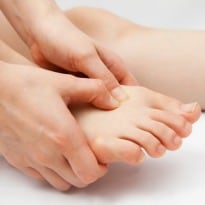Gout is a medical condition which is a severe form of arthritis. It includes sudden attacks of pain, redness, inflammation and tenderness in joints, often the one at the base of the big toe. Men are more susceptible to gout but women may also be at risk, especially after menopause.Gout occurs when uric acid crystals accumulate in the joint. This happens due to high levels of uric acid in the blood. Some other causes of gout may include lifestyle, dietary habits and genetic disposition. A new study published in the Arthritis & Rheumatology, a journal of the American College of Rheumatology (ACR), has found that the risk of acute gout attacks is two times higher during the night or early morning hours than it is in the daytime.According to lead author Hyon Choi of the Massachusetts General Hospital and the Harvard Medical School in the US, "It is speculated that lower body temperature, night-time dehydration, or a nocturnal dip of cortisol levels may contribute to the risk of gout attacks at night."
To reach this conclusion, the research team recruited 724 gout patients, who were followed for one year via the internet. Findings indicate that participants experienced 1,433 gout attacks - 733 in the overnight hours (midnight to 7.59 a.m.), 310 in the daytime (8.00 a.m. to 2.59 p.m.), and 390 in the evening (3.00 p.m. to 11.59 p.m.) during the one-year study period.The risk of a gout flare was 2.4 times higher overnight and 1.3 times higher in the evening compared to daytime hours. "As a result of our study, prophylactic measures that prevent gout flares, especially at night, may be more effective," the researchers said.Furthermore, researchers found that this risk persisted even among those with no alcohol intake and low purine intake during the 24 hours prior to the gout attack. The body produces uric acid from the process of breaking down purines - the natural substances that are found in cells and in certain foods like organ meat, seafood and alcohol (yeast).With inputs from IANS
To reach this conclusion, the research team recruited 724 gout patients, who were followed for one year via the internet. Findings indicate that participants experienced 1,433 gout attacks - 733 in the overnight hours (midnight to 7.59 a.m.), 310 in the daytime (8.00 a.m. to 2.59 p.m.), and 390 in the evening (3.00 p.m. to 11.59 p.m.) during the one-year study period.The risk of a gout flare was 2.4 times higher overnight and 1.3 times higher in the evening compared to daytime hours. "As a result of our study, prophylactic measures that prevent gout flares, especially at night, may be more effective," the researchers said.Furthermore, researchers found that this risk persisted even among those with no alcohol intake and low purine intake during the 24 hours prior to the gout attack. The body produces uric acid from the process of breaking down purines - the natural substances that are found in cells and in certain foods like organ meat, seafood and alcohol (yeast).With inputs from IANS
Advertisement








